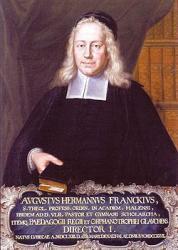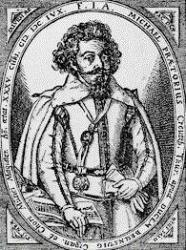1723 - 1801 Hymnal Number: 308 Author of "Ach, mein Herr Jesu! Dein Nahesein" in Deutsches Gesangbuch Gregor, Christian, son of Georg Gregor, a peasant living in the Silesian village of Dirsdorf, near Peilau, was born at Dirsdorf, Jan. 1, 1723. In 1742 he went to Herrnhut, where he was at first employed in tuition. He became leader of the music in the [Moravian] Brethren's congregation at Herrnhaag, in 1748, and in 1749 at Zeist; but in 1753 he returned to Herrnhut as cashier of the Brethren's Board of Direction. He was, in 1756, ordained diaconus, in 1767 presbyter, and in 1789 bishop of the Brethren's Church. On Nov. 6,1801, he attended a meeting, held at Herrnhut, of the Board of Direction of which he had been a member from 1764. Just as he entered his house at Berthelsdorf, near Herrnhut, he was struck with paralysis, and died that same day. (Koch, vi. 436; Allgemeine Deutsche Biographie, ix. 630.)
He was a man greatly beloved and respected, simple of heart, loving, earnest and hardworking; and was entrusted with many important missions and visitations. His hymns are characterised by childlike fervour of devotion to his crucified Lord. A number appeared in Des kleinen Brüder-Gesangbuchs dritter Theil, Barby, 1767; but they were mostly contributed to the Gesang-buch zum Gebrauch der evangelischen Brüder Gemeinen, Barby, 1778, of which he was the principal editor. He was also an excellent organist, and edited, in 1784, a collection of accompanying tunes for the hymnbook of 1778, contributing thereto various melodies by himself. A little volume entitled Historische Nachrteht vom Brüder-Gesangbuche des Jahres 1778, und von dessen Lieder-Verfassern, Gnadau, 1835 (2nd ed., 1851), occasionally referred to in these pages, is based on materials collected by Gregor.
His hymns in English common use are:—
i. Bis dereinst mein Stündlein schlägt. [Love to Christ.] 1778, No. 640, in 5 st. of 4 1. Translated as:—
Till permitted hence to go, of st. i., ii., iv., as No. 563 in the Moravian Hymn Book, 1801 (1886, No. 1228). In 1826 an original st.anza by T. Bird was added, beginning, " Till the day when I shall tread." Repeated thus in 1886, No. 1228, and in J. A. Latrobe's Collection, 1841, No. 484.
ii. Die Gottes Cherubim. [The Angels.] Appeared as No. 1877 in Appendix xii. c, 1746, to the Herrnhut Gesang-Buch of 1735, thus :—
"Die Gottes Cherubim
Erheben ihre Stimm,
(Funkelnd von Blitz und Strahl,)
Ihr Lied ist, wenn ichs sagen darf,
Dazu spielt mehr als eine Harf:
Ehre dem Seitenmaal!"
In 1778 it is included as No. 1600, beginning, "Die Gottes Seraphim," and expanded to three stanzas; i. of the Angels; ii. of the Redeemed; iii. of the Church on Earth. Here the song, "Ehre dem Seitenmaal," is given to the Church on Earth, and a paraphrase of Is. vi. 3, to the Angels. The only translation in common use is :—
The Seraphim of God, in full from the 1778, by J. Miller and F. W. Foster, as No. 792 in the Moravian Hymn Book, 1789 (1886, No. 1220), repeated in J. A. Latrobe's Collection, 1841, No. 424. Another translation is The Cherubims of God," from the original form, as No. 93 in pt. iii. of the Moravian Hymn Book, 1748.
iii. Heiliger, heiliger, heiliger, Herr Zebaoth. [Public Worship.] The introductory hymn in 1778, in 4 st. of 81, as on "The Word of God." The only translation is:—
Holy Lord, Holy lord, Holy and Almighty Lord, by F. W. Foster, C. G. Clemens, and J. Swertner, as No. 1 in the Moravian Hymn Book, 1789 (1886, No. 1). Included from the text of 1801, as No. 217 in Dr. Pagenstecher's Collection, 1864.
iv. Nach tausendfachen Plagen. [Passiontide.] 1778, No. 128, in 8 1. It is translated as :—
Behold, my soul, Thy Saviour, by P. H. Molther, as No. 352 in the Moravian Hymn Book, 1789. See No. vi.
v. 0 angenehme Augenblicke. [Eternal Life.] Written in 1766. In 1778, No. 1749, in 2 st. of 8 1. The translations are :—
1. What heavenly joy and consolation, by P. H, Molther, of st. i., as No. 886 in the Moravian Hymn Book, 1789 (1886, No. 1314, st. iii.). Included as st. iii. of No. 403 in the Irish Church Hymnal, 1873.
2. 0 what joy, 0 what joy awaiteth me. No. 988 in the Moravian Hymn Book, 1801. In the 1886 edition it is marked as a translation of No. v. as above. It bears more resemblance, however, to "O wie wallt mein Herz," which is No. 268 in the 1806 Appendix to the Brüder Gesang-Buchof 1778.
vi. 0 süsse Seelenweide. [Passiontide.] 1778, No. 167, in 11 st. of 8 1. St. i., ii. are ascribed to Gregor; iii., iv., xi. to Johann Prätorius ; and v.-x. to C. B. von Zinzendorf (taken from Nos. 40 and 41 of the collected edition of his hymns, 1754). The translation is:—
How is my soul delighted, a translation of st. i., ii., iv., v., vii., x. by F. W. Foster, and J. Miller, as No. 360 in the Moravian Hymn Book, 1789. In the 1801 and later editions (1886, No. 407), Molther's translation of No. iv. was prefixed as st. i., new trranslations of st. viii., x. given, and the rest altered. In the Book of Common Praise, ed. 1872, No. 86, is st. i., ii., 11. 5-8, and iii., by Gregor; and iv., 11. 5-8, by Prätorius, beginning, "Behold, my soul, thy Saviour."
vii. 0 Tage wahrer Seligkeit. [Joy of Forgiveness.] 1778, No. 398, in 6 st. of 8 1., included in the Berlin Geistliche Lieder S. , ed. 1863. Translated as:—
O days of solid happiness in full as No. 340 in the Moravian Hymn Book, 1801 (1886, No. 386). Two centos from the text of 1849 are in common use :—
1. "What days of solid happiness," st. i.-iv., as No. 433 in the edition of 1857 of Mercer's The Church Psalter & Hymnbook.
2. "Whene'er we contemplate the grace," st. iv.-vi. as No. 396 in the Irish Church Hymnal, 1873.
viii. Wenn schlägt die angenehme Stunde. [Ascension.] Written for Aug. 17, 1765, and included as No. 113 in 1767, as above, in 8 1. Translated as :—
When, O when shall I have the favour, by P. H. Molther, c. 1774, included as No. 839 in the Moravian Hymnbook, 1789, repeated as st. ii. of No, 403, in the Irish Church Hymnal, 1873. In the 1886 ed. of the Moravian Hymnbook, No. 1314, it begins, "O when shall I have that great favour."
ix. Wie wifd mir einst dooh sein. [Eternal Life.] 1778, No. 1743, in 10 st. of 6 1. In the Historische Nachricht thereto, st. i.-iii. are marked as by Gregor, and st. iv.-x. as by N. L. von Zinzendorf. St. iv.-x. are recast from a hymn beginning, "Die Bäume blühen ab," writ¬ten in the autumn of 1721, and included as No. 1245 in the 3rd edition, 1731, of his Sammlung geistund lieblicher Lieder, in 46 st. of 4 1., the stanza of the original used being in order 39, 42, 34, 18, 22, 29, 45. The only translation in common use is:—
What shall I feel, when I, in full from the 1778, by J. A. Latrobe, as No. 885 in the Moravian Hymnbook, 1789 (1886, No. 1301). Two centos are in use:-
1. "How shall the joy be told"; st. i.-iv., vi., viii. altered in J. A. Latrobe's Collection, 1841, No. 498.
2. "I hear the enraptured song"; st. 2, 6, 9, 10, as No. 582 in the App. of 1873 to Mercer's The ChurchPsalter & Hymnbook.
Hymns not in English common use:—
x. Ach mein Heir Jesu! dein Nahesein. Communion with Christ. 1767, as above, No. 432, in 10 st. In the Berlin Geistliche Lieder S.,, ed. 1863, No. 925. Justly characterised by Dr. Schaff in his Christ in Song, 1869, p. 496, as "One of the sweetest hymns from the holy of holies of the believer's personal communion with his Saviour, and very characteristic of Moravian piety in its best form." The trsanslations are (1) "What peace divine, what perfect happiness," by P. H. Molther, as No. 278 in the Moravian Hymn Book, 1789 (1849, No. 362). In the 1886 ed. of the Moravian Hymn Book, No. 359, it begins with the translation of st. v., "Gracious Redeemer, grant to us while here." (2) "Jesus, our Lord, when Thou art near," by Dr. H. Mills, 1845 (1856, p. 122). (3) "Ah dearest Lord! to feel that Thou art near," by Miss Winkworth, 1858, p. 168. (4) "Ah, Jesus, Lord, Thou art near to me," in the British Herald, Dec, 1866, p. 372, and as No. 304 in Reid's Praise Book, 1872. (5) "Jesus, my Lord, Thy nearness does impart," by E. Reynolds for Schaff’s Christ in Song, 1869, p. 496.
xi. Hallelujah! der Heiland lebt. Easter. 1778, No. 203, in 17 st. (st. xiv. being by Matthaus Stach, and first published as st. ii. of No. 109, in 1767). Translated as "Sing Hallelujah, Christ doth live," as No. 131 in the Moravian Hymn Book, 1801 (1886, No. 142), repeated in Bishop Ryle's Collection, 1860, No. 131. Beginning with the translation of st. ix., “The God of Peace, to guilty man," 6 st. were included as No. 90 in Reid's Praise Book, 1872. [Rev. James Mearns, M.A.]
-- John Julian, Dictionary of Hymnology (1907)
Christian Gregor

